“外研社杯”英语辩论赛校内选拔赛
全国大学生英语辩论赛校园选拔章程
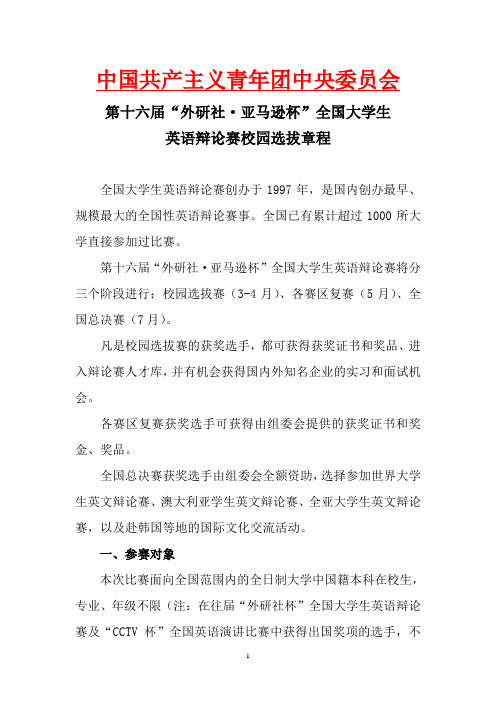
中国共产主义青年团中央委员会第十六届“外研社·亚马逊杯”全国大学生英语辩论赛校园选拔章程全国大学生英语辩论赛创办于1997年,是国内创办最早、规模最大的全国性英语辩论赛事。
全国已有累计超过1000所大学直接参加过比赛。
第十六届“外研社·亚马逊杯”全国大学生英语辩论赛将分三个阶段进行:校园选拔赛(3-4月)、各赛区复赛(5月)、全国总决赛(7月)。
凡是校园选拔赛的获奖选手,都可获得获奖证书和奖品、进入辩论赛人才库,并有机会获得国内外知名企业的实习和面试机会。
各赛区复赛获奖选手可获得由组委会提供的获奖证书和奖金、奖品。
全国总决赛获奖选手由组委会全额资助,选择参加世界大学生英文辩论赛、澳大利亚学生英文辩论赛、全亚大学生英文辩论赛,以及赴韩国等地的国际文化交流活动。
一、参赛对象本次比赛面向全国范围内的全日制大学中国籍本科在校生,专业、年级不限(注:在往届“外研社杯”全国大学生英语辩论赛及“CCTV杯”全国英语演讲比赛中获得出国奖项的选手,不能再次参赛)。
比赛不收取报名费、参赛费等任何费用。
二、报名方式本次比赛共分两个阶段接受报名,均需在比赛官方网站()上进行报名,细则如下。
(一)高校官方报名(截至2012年4月15日)1.凡参加大赛的高校,请务必于4月15日前在比赛官方网站上进行学校报名。
只有在官网报名的高校才可获得由组委会提供的证书和奖品。
2.为保证报名信息的真实性,学校须在大赛官网上下载“学校报名表”,填写后加盖学校团委办公室公章后发至组委会秘书处邮箱(chinadebate2012@)。
(二)参赛团队报名(截至2012年4月15日 18:00)1.校园选拔赛采取自由报名形式,以团队为报名,每队由同一学校的2名学生和1名指导老师组成;原则上不接受跨学校报名。
2. 参赛团队在网站中选择所在高校后,继续完成下一步报名程序,即填写详细准确的报名信息。
内容包括:(1)队名(要求:文明、富有朝气、能展现当代大学生风采,控制在10个字符内,中英文不限),队名将作为该队的唯一有效标识出现在选拔赛的对阵表中;(2)2名辩手的姓名、所在院系及年级、手机号、常用邮箱;(3)1名指导老师的姓名、所在院系。
【优质文档】“外研社杯”全国英语辩论赛辩题word版本 (5页)
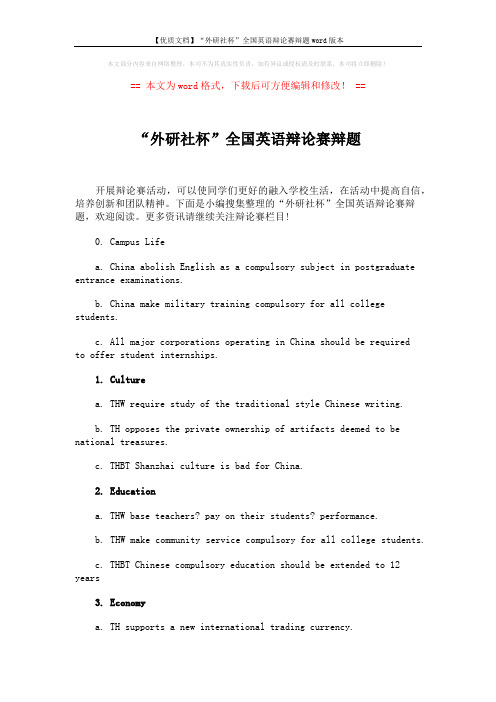
本文部分内容来自网络整理,本司不为其真实性负责,如有异议或侵权请及时联系,本司将立即删除!== 本文为word格式,下载后可方便编辑和修改! ==“外研社杯”全国英语辩论赛辩题开展辩论赛活动,可以使同学们更好的融入学校生活,在活动中提高自信,培养创新和团队精神。
下面是小编搜集整理的“外研社杯”全国英语辩论赛辩题,欢迎阅读。
更多资讯请继续关注辩论赛栏目!0. Campus Lifea. China abolish English as a compulsory subject in postgraduate entrance examinations.b. China make military training compulsory for all college students.c. All major corporations operating in China should be requiredto offer student internships.1. Culturea. THW require study of the traditional style Chinese writing.b. TH opposes the private ownership of artifacts deemed to be national treasures.c. THBT Shanzhai culture is bad for China.2. Educationa. THW base teachers? pay on their students? performance.b. THW make community service compulsory for all college students.c. THBT Chinese compulsory education should be extended to 12 years3. Economya. TH supports a new international trading currency.b. THB that China should stop buying US debt.c. China should issue consumption vouchers to stimulate the economy.4. Global climate changea. Developed nations should accept global warming refugeesb. Those affected by global climate change should have the right to sue major carbon-emitting nations.c. China should cap its carbon emissions.5. East Asiaa. Immediate elections are in Thailand抯 best interest.b. ASEAN should expel Myanmarc. Direct negotiations between the US and North Korea are preferable to the Six-Party Talks.6. Family & Populationa. THBT women should be allowed to sell their eggsb. TH would require the father抯 consent for abortions.c. China should legalize marriage between homosexuals.7. Crime & Punishmenta. Criminals sentenced to life imprisonment without parole should be allowed to choose death instead.b. China should establish a national DNA database of all citizens for the purposes of criminal investigations.c. This house would make parents liable for their children抯crimes.8. Governing & Governmenta. THW make one-year military service a qualification for public servants.。
外研社·国才杯”英语辩论赛赛攻略
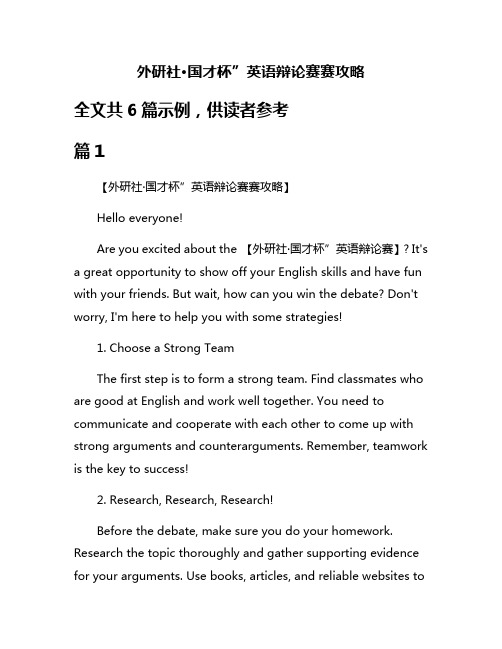
外研社·国才杯”英语辩论赛赛攻略全文共6篇示例,供读者参考篇1【外研社·国才杯”英语辩论赛赛攻略】Hello everyone!Are you excited about the 【外研社·国才杯”英语辩论赛】? It's a great opportunity to show off your English skills and have fun with your friends. But wait, how can you win the debate? Don't worry, I'm here to help you with some strategies!1. Choose a Strong TeamThe first step is to form a strong team. Find classmates who are good at English and work well together. You need to communicate and cooperate with each other to come up with strong arguments and counterarguments. Remember, teamwork is the key to success!2. Research, Research, Research!Before the debate, make sure you do your homework. Research the topic thoroughly and gather supporting evidence for your arguments. Use books, articles, and reliable websites togather information. The more you know about the topic, the stronger your arguments will be.3. Know Your AudienceDuring the debate, it's important to know your audience. Understand their perspectives and try to tailor your arguments accordingly. Think about what might convince them and address their concerns. This shows that you respect their opinions and can help you win their support.4. Structure Your ArgumentsA well-structured argument is essential in a debate. Start with a clear introduction to grab the audience's attention. Then present your main points with supporting evidence. Use examples, statistics, and personal experiences to make your arguments more convincing. Finally, summarize your key points in a strong conclusion.5. Practice, Practice, Practice!Practice makes perfect! Rehearse your arguments with your teammates before the debate. Pay attention to your body language, voice projection, and clarity of speech. Practice responding to possible counterarguments as well. The more you practice, the more confident you'll feel on the stage.6. Be RespectfulRemember, a debate is a respectful exchange of ideas. Listen carefully to the opposing team's arguments and respond in a polite manner. Avoid personal attacks or disrespectful language. Focus on the topic and present your arguments confidently and respectfully.7. Time ManagementTime management is crucial in a debate. Make sure you allocate enough time for each point and stick to the time limits. Be concise and to the point while presenting your arguments. Practice speaking within the time limits to avoid rushing or running out of time.8. Stay Calm and ConfidentLast but not least, stay calm and confident throughout the debate. Take deep breaths and remind yourself that you're prepared and knowledgeable about the topic. Speak clearly and maintain eye contact with the audience. Remember, confidence can win half the battle!ConclusionWith these strategies in mind, you're ready to rock the 【外研社·国才杯”英语辩论赛】! Work together with your team, do yourresearch, and present your arguments with confidence and respect. Remember, winning isn't everything. Enjoy the process, have fun, and learn from the experience. Good luck, and may the best team win!Yours cheerfully,[Your Name]P.S. Remember to smile and have fun!篇2How to Win the English Debate CompetitionHi there! My name is Lily and I'm a 5th grader. I just won the big English debate tournament at my school and I'm going to tell you all my tips and tricks for how to be a debate champ!First things first, you have to pick a really good topic to debate about. The best topics are things that you feel really passionate about, because then you'll have lots of energy and enthusiasm when you're debating. It could be something fun like whether dogs or cats make better pets. Or something more serious like if junk food should be banned at school.Whatever topic you choose, you have to do a ton of research and preparation! That's probably the most important thing forwinning a debate. You can't just go up there and wing it. My parents helped me find lots of books, websites, and videos about my topic so I could learn all the facts and details inside and out.While I was researching, I made sure to look at the issue from both sides - the pros and the cons. That way I could anticipate what arguments the other team might make and be ready with counter-arguments and rebuttals. I wrote down every possible point and piece of evidence, both supporting my side and the opposite view.Then I organized all my notes and evidence into a logical structure with an introduction, key arguments, and conclusion. The introduction needs to clearly state what side of the debate you are on. The body arguments need to flow smoothly from one point to the next. And the conclusion should restate your position and why your side is right in a persuasive way.Practicing your whole debate case out loud is super important too. I did mock debates with my parents where they would play the role of the opposing team. That helped me get comfortable with my arguments and rebuttals. It also helped me work on my public speaking skills like eye contact, hand gestures, vocal variety, and other techniques to keep the audience engaged.One trick I learned is to write rebuttals on little index cards or sticky notes. Then during the actual debate, I could quickly find the right rebuttal I had prepared for whatever point the other team made. It saved me from getting flustered or blanking out under pressure.Speaking of pressure, one of the hardest parts of debating is when the other team is cross-examining you by firing questions rapidly. They might try to confuse you or put you on the spot. My coach taught me to pause and take a breath before answering each cross-ex question. That little pause helped me stay calm and focused instead of getting razzed.You also need to be ready to "flow" during the debate, which means taking detailed notes about everything the opponents say. Careful flowing lets you identify gaps, contradictions or weak points in their arguments that you can exploit in your rebuttals. It's like a mental workout trying to flow, present your case, and devise strategies all at the same time!In the heat of the debate, it's easy to get flustered or lose your train of thought sometimes. If that happens, just stop, take a sip of water, and reset. Don't panic or freeze up. The judges will understand if you need to pause for a moment to collect yourself.When it's time for the closing statements, that's your final chance to drive your key points home. Reviewthe major arguments you won and the flaws in the opponents' case. Then crescendo with your most persuasive reasoning for why you decisively proved your side of the resolution. Close with passion and confidence!Whether you win or lose, the most important thing is to be a good sport and shake hands with the other team afterward. In debate, as in life, you have to be able to graciously accept setbacks and learn from them. Every debate is a chance to improve your skills for next time.Well, those are my top tips for rocking the English debate scene! The more you practice, the better and more confident you'll become. If you prepare diligently, stay poised under pressure, and debate with enthusiasm, I'm sure you'll be a champion too. The winner's circle awaits - go get 'em!篇3The "Global Talents Cup" English Debate: A Kid's Guide to WinningHey there, fellow kids! I'm sure you're all pumped up for the "Global Talents Cup" English Debate hosted by ForeignLanguage Teaching and Research Press (FLTRP). It's the ultimate battle of wits and words, where you get to show off your English skills and prove you're a true debating champ!Now, I know what you're thinking – debating sounds scary, right? All those big words and complicated arguments? Fear not, my friends! I've got some totally awesome tips that'll turn you into an unstoppable debating machine. Just follow my lead, and that shiny trophy will be yours in no time!Tip #1: Be a Sponge for KnowledgeThe first step to being a debate master is to soak up as much information as you can about the topic. Read books, watch videos, and ask your super-smart teachers lots of questions. The more you know, the better you can argue your case and shut down your opponents with facts and evidence.Tip #2: Practice Makes PerfectOnce you've crammed your brain with knowledge, it's time to start practicing your debating skills. Grab a friend or family member and have a friendly debate about anything – from whether pizza is better than burgers to which superhero is the coolest. The more you practice, the more comfortable you'll feel speaking in front of others and thinking on your feet.Tip #3: Learn to ListenDebating isn't just about talking – it's also about listening carefully to what your opponents say. Pay close attention to their arguments and look for any weaknesses or flaws. That way, you can poke holes in their case and make your own arguments even stronger.Tip #4: Use Your Body LanguageWhen you're up on that debate stage, your body language can be just as important as the words coming out of your mouth. Stand tall, make eye contact, and use confident gestures to show that you mean business. A strong presence can go a long way in convincing the judges that you're the one to beat.Tip #5: Stay Calm and ConfidentDebating can be intense, and sometimes your opponents might try to ruffle your feathers or throw you off your game. But remember, you're a cool cucumber! Take a deep breath, keep your composure, and don't let anything shake your confidence. If you believe in your arguments and present them with clarity and poise, you'll be unstoppable.Tip #6: Have Fun!At the end of the day, debating is all about having a good time and showing off your skills. Don't get too wrapped up in winning or losing – just enjoy the experience of putting your English knowledge to the test and going head-to-head with other brilliant kids. The more fun you have, the better you'll perform!So, there you have it, my friends – the ultimate kid's guide to dominating the "Global Talents Cup" English Debate. Now, go out there and show the world what you're made of! Remember, you've got this – you're a debating superstar in the making. Good luck, and may the best kid win!篇4Hey there, fellow debaters! Are you ready to conquer the New Oriental · Guocai Cup English Debate Competition? If you're feeling a bit nervous, don't worry – I've got some awesome tips to help you slay this debate like a pro!First things first, let's talk about preparation. You can't just wing it when it comes to debating – you've got to do your homework! That means researching your topic inside and out. Read up on the facts, gather evidence, and make sure youunderstand both sides of the argument. The more you know, the better you'll be able to argue your case.Next up, teamwork! Debating is a team sport, and you've got to work together with your partner (or partners, if it's a group debate). Discuss your strategies, divide up the arguments, and make sure you're not stepping on each other's toes. Communication is key, so don't be afraid to speak up if you have a brilliant idea or if you think your teammate is missing something important.Now, let's talk about the actual debate itself. When you're up there on the stage, it's important to stay calm and focused. Take a deep breath, stand up straight, and speak clearly and confidently. Remember, the judges are looking for poise and professionalism, so try to avoid fidgeting or using too many "ums" and "uhs."One of the most important things in a debate is listening. You've got to pay close attention to what your opponents are saying, so you can respond to their arguments effectively. Don't just wait for your turn to talk – actually listen to what they're saying, and be ready to counter their points with solid evidence and logic.Speaking of countering arguments, that's a crucial part of debating. When your opponents make a point, you've got to be ready to poke holes in their logic or provide evidence that contradicts their claims. But be careful – you don't want to come across as rude or disrespectful. Stay polite and professional, and focus on the facts, not personal attacks.One thing that can really make or break a debate is your delivery. Even if you have great arguments, if you're mumbling or speaking too softly, the judges (and your opponents) might not be able to understand you. Speak loudly and clearly, and use gestures and body language to emphasize your points. But don't go overboard – you don't want to come across as overly dramatic or theatrical.Finally, don't forget to have fun! Debating can be a bit nerve-wracking, but it's also an amazing opportunity to showcase your skills and learn new things. Embrace the challenge, and enjoy the thrill of intellectual competition.Okay, so those are my top tips for rocking the New Oriental · Guocai Cup English Debate Competition. Remember, preparation, teamwork, poise, listening skills, countering arguments, clear delivery, and a positive attitude are all key to success.Now, go out there and show 'em what you've got! Whether you're arguing for or against, just remember to stay confident, stay focused, and most importantly, have fun. Good luck, debaters – I'll be cheering for you!篇5Waiyanjia National Talent Cup English Debate Competition GuideHi everyone! My name is Xiaohua and I'm a 5th grade student. I recently participated in the Waiyanjia National Talent Cup English Debate Competition and I'm super excited to share my experience and tips with you!First of all, what is the Waiyanjia National Talent Cup English Debate Competition? It's a really cool debate contest for elementary and middle school students all across China. Teams of three students debate against each other in English on different topics. The best teams get to move on to the regional and then national rounds. How awesome is that?When I first heard about the competition from my English teacher, I was really nervous. Speaking English in front of so many people? That sounded terrifying! But my best friends Lily and David convinced me that we should form a team and give ita try. I'm so glad they did because it ended up being one of the most fun and rewarding experiences ever.Preparing for the DebateThe first step was choosing a topic to debate about. The competition gives you a few options and your team needs to pick one side to argue for or against. We chose to argue against the topic "Elementary school students should not have more than 1 hour of homework per night." Lily, David and I all have a ton of homework, so we knew we could speak passionately about that subject.Next up was doing research to find strong arguments and evidence to support our side. We spent weeks in the library looking through books and articles about homework policies in different countries. We made sure to find lots of expert opinions and statistics to back up our points. Gathering all that information was hard work, but it was really satisfying putting all the pieces together.Once we had our research ready, it was time to start practicing our debate speeches and rebuttals. Rebuttals are when you respond to and poke holes in the other team's arguments. We split up the different points and had each personprepare a speech section. I was in charge of the opening arguments.Practicing those speeches out loud was brutally hard at first.I fumbled over words, forgot my points, and spoke way too fast because I was nervous. But Mr. Wang, the English debate club teacher, gave us lots of useful feedback and tips. Like taking deep breaths, maintaining eye contact, speaking slowly and clearly, and being expressive with gestures and vocal variety.The more we drilled those speeches, the more confident and polished we became. We also watched video examples of good and bad debating techniques. Seeing other students' strengths and mistakes was super helpful for our own preparation.By the time the day of the first round arrived, we felt ready to face our opponents with our well-researched arguments and smooth delivery. Were we still a little scared? You bet! But we had each other's backs and a common determination to do our absolute best.The Debate DaysThe elementary school regional debate competition took place over two Saturdays. On the first day, we had twoback-to-back debates in the morning against two differentteams. I don't think my heart has ever beaten so fast! But as soon as I started giving my opening arguments, a weird calmness came over me. All the practicing paid off and the words flowed out smoothly.Lily and David did an amazing job too. Lily poked so many logical holes in the other team's reasoning during the rebuttal. And David's passionate closing arguments had me ready to join his crusade against excessive homework! In the end, we won both of those morning debates and advanced to the afternoon semifinal round.The competition was incredible to watch too. The other teams had such different debating styles and tones. Some were dramatic, aggressive, and in your face. Others were more relaxed and philosophical. A few impressive students sprinkled in humor and charming anecdotes to make their points memorable.Between rounds, our amazing teacher Mr. Wang would give us feedback and advice for adjustments. He reminded us to speak louder, gesture more confidently, and drive key arguments home with greater repetition. Those little tweaks made our semifinal debate performance even stronger than the morning.Sadly, we ended up losing a hard-fought semifinal debate to an outstanding team from Nanjing. While we were disappointed,the judges' comments praised our teamwork, smooth transitions between speakers, and strong grasp of the evidence. Just making it to the semifinals at our first debate competition felt like a huge victory.But you know what? The best part wasn't the awards or rankings. It was the journey itself and everything my teammates and I gained through the experience...What I LearnedFirst off, my English skills improved drastically from all the research, writing, and public speaking practice. I became much more comfortable comprehending, discussing, and debating complex issues in English. My vocabulary expanded, my pronunciation sharpened, and my overall confidence soared. Thanks Waiyanjia competition!Equally important were the life skills I developed through debate. Researching credible sources and analyzing evidence from multiple perspectives taught me how to think critically. Crafting persuasive arguments and defining clear points forced me to practice structured logic. And of course, respecting opponents while firmly denouncing their arguments was an exercise in constructive disagreement.Teamwork and leadership also grew tremendously. Dividing responsibilities, compromising on strategies, and supporting each other's strengths and weaknesses doesn't just happen automatically. It takes constant communication, compromise, and checking your ego at the door for the good of the team.Honestly, debate was one of themost intense extracurricular activities I've ever done. The pressure of competition with stakes on the line was an awesome adrenaline rush. But it also taught me how to manage nerves, overcome fear, and stay poised under that bright spotlight. Increasingly, I realized that when I stumbled or freezed up, it wasn't the end of the world. I could reset, recover my flow, and keep charging ahead.In the end, win or lose, what mattered most was the incredible sense of accomplishment from challenging myself far beyond what I thought possible. I surprised myself over and over with how much I was capable of when I stopped doubting and started doing. That self-confidence booster will stick with me forever.The Waiyanjia National Talent Cup English Debate Competition was one of the most enriching and empowering experiences of my life so far. While exhausting, it fed my competitive drive, expanded my skills, and pushed me to newlevels of discipline and teamwork. I can't wait to sharpen those talents further and take on the middle school division next year!To any elementary or middle school student out there considering giving debate a try, I can't recommend it enough. Sure, it's intimidating, but that's exactly why you should do it! Life begins outside your comfort zone. Debate will open up amazing opportunities for personal growth, lasting friendships, and priceless communication abilities.So what are you waiting for? Talk to your English teacher about starting a debate club at your school if you don't already have one. Then study hard, practice like crazy, and get ready to out-argue the competition! Let's go future debaters!!篇6The Ultimate Guide to Rocking the National Talent Cup English DebateHi there, fellow debaters! Are you feeling pumped and ready to show off your English skills at the big National Talent Cup debate? Or are you a little nervous about facing off against so many smart kids from across the country? Don't worry, I've got your back with all the tips and tricks you need to shine on that debate stage!First things first, let's talk about why debating in English is so awesome. Not only do you get to practice your speaking and listening abilities, but you also learn how to think critically, build persuasive arguments, and respect different viewpoints. Those are seriously cool skills that will help you out in school and life! Plus, you might just make some new friends who share your love of language and friendly competition.Now that we've covered why debate is the best, it's time to dive into my full-proof strategy for bringing home that shiny trophy. Get ready to take some notes!Preparation is KeyYou can't just wing it when it comes to debate. Putting in the hard work ahead of time is crucial for success. Here are my top prep tips:Research, research, research! Read up on the debate topics from all angles so you truly understand the different perspectives. Gather facts, stats, expert opinions - anything to bolster your arguments.Practice giving speeches out loud, either alone or with a buddy. Time yourself and get comfortable expressing your thoughts clearly and confidently.Anticipate counterarguments. What might the other team say to poke holes in your reasoning? Have solid rebuttals ready to go.If you'll be working with a partner, coordinate your arguments and practice your teamwork. You'll need to back each other up seamlessly.Get enough sleep and eat a good breakfast on debate day! You'll need all your brainpower firing on all cylinders.During the DebateOkay, the big moment has arrived and it's showtime! As you step up to the podium, keep these pointers in mind:Speak slowly and clearly. It's okay to pause for a few seconds to gather your thoughts between points. Taking your time is better than jumbling your words.Make eye contact with the judges and opposing team. This shows confidence and keeps your audience engaged.Use confident body language. Stand up straight, avoid fidgeting, and don't forget to breathe!Listen actively when it's not your turn to speak. Take notes on the other team's arguments so you can offer strong rebuttals.If you get flustered or stuck, have a sip of water and regroup.A short silence is better than rambling nonsense.Most importantly, speak from the heart. Your passion and authentic voice will make a bigger impact than just spitting out rehearsed lines.Staying Cool Under PressureLet's be real - debates can get heated sometimes! The other team might say something that riles you up or pokes holes in your well-prepared arguments. When that happens, you'll need to keep your cool. Here's how:Take a deep breath before responding. Never lash out or say something you'll regret in the heat of the moment. Stay calm and collect your thoughts.Have a few go-to phrases ready to politely disagree, like "I respectfully disagree because..." or "Another way to look at this is..."Avoid putting down the other team's arguments or getting personal. Stick to the facts and keep things focused on the debate topics.If you get flustered, it's okay to say something like "Let me think about that for a moment." Pause, collect yourself, then continue.Remember, getting frazzled or angry during a debate is completely normal! The judges know dealing with pressure is part of the challenge. As long as you handle it maturely, a few hiccups won't tank your score.Win or Lose, Have Fun!At the end of the day, the National Talent Cup debate is all about challenging yourself, learning new skills, and maybe making lifelong friends who love language as much as you do. So whether or not you take home that trophy, make sure you're soaking up every awesome moment!If you do end up winning, wahoo! Give yourself a big pat on the back and celebrate your hard work. Just don't gloat too much in front of the other teams, okay? Good sportsmanship is crucial.And if things don't go your way this time, no biggie! Look at it as motivation to study up, practice more, and come back even stronger next year. Every debate is a chance to grow.Most importantly, always remember why you decided to join the debate club in the first place - because you sincerely love using English to express your brilliant ideas and unique perspective. Never lose sight of that!Well, there you have it - all my tips and tricks for totally rocking the National Talent Cup debate. I know you've got this! Just breathe, believe in yourself, and get ready to wow those judges.I'll be cheering you on every step of the way. Now go get 'em, debate superstars!。
“外研社杯”英语辩论赛校内选拔赛
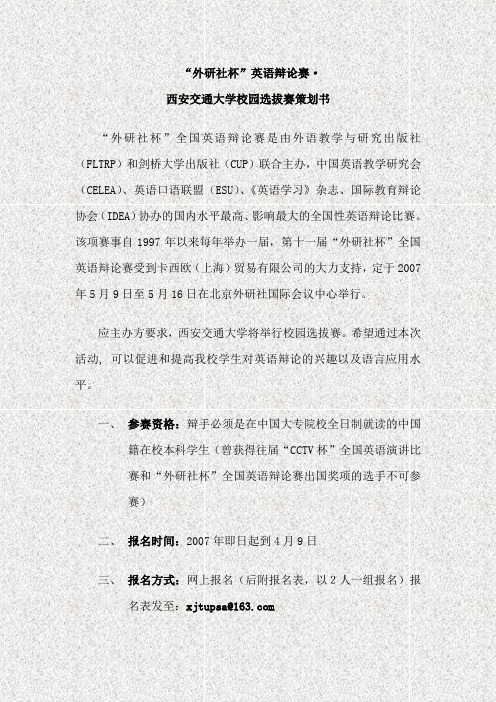
“外研社杯”英语辩论赛·西安交通大学校园选拔赛策划书“外研社杯”全国英语辩论赛是由外语教学与研究出版社(FLTRP)和剑桥大学出版社(CUP)联合主办,中国英语教学研究会(CELEA)、英语口语联盟(ESU)、《英语学习》杂志、国际教育辩论协会(IDEA)协办的国内水平最高、影响最大的全国性英语辩论比赛。
该项赛事自1997年以来每年举办一届,第十一届“外研社杯”全国英语辩论赛受到卡西欧(上海)贸易有限公司的大力支持,定于2007年5月9日至5月16日在北京外研社国际会议中心举行。
应主办方要求,西安交通大学将举行校园选拔赛。
希望通过本次活动, 可以促进和提高我校学生对英语辩论的兴趣以及语言应用水平。
一、参赛资格:辩手必须是在中国大专院校全日制就读的中国籍在校本科学生(曾获得往届“CCTV杯”全国英语演讲比赛和“外研社杯”全国英语辩论赛出国奖项的选手不可参赛)二、报名时间:2007年即日起到4月9日三、报名方式:网上报名(后附报名表,以2人一组报名)报名表发至:xjtupsa@四、比赛时间: 2007年4月14日-15日五、比赛地点:教一北二楼语言实验室六、比赛形式: 比赛将采用议会制。
循环赛采用积分制(赢一场:+1;平:0;输:-1);半决赛及决赛采用淘汰制。
七、奖项设置:校园选拔赛:将选出一支冠军队,直接到北京参加全国比赛;一支亚军队、及二支季军队。
最佳辩手5人全国比赛:冠军队:参加世界大学英语辩论赛亚军队:参加澳亚大学英语辩论赛季军队:参加亚洲大学英语辩论赛最佳辩手(6人):参加国际教育辩论协会辩论培训八、奖品:由外研社提供的奖品西安交通大学外国语学院英语系2007-3报名表辩论队一辩姓名性别学院手机E-mail 年级二辩姓名性别学院手机E-mail 年级。
南阳师范学院英语辩论赛
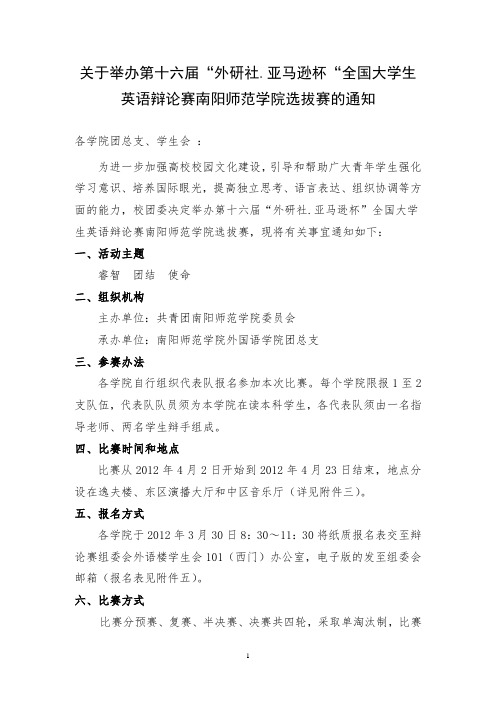
关于举办第十六届“外研社.亚马逊杯“全国大学生英语辩论赛南阳师范学院选拔赛的通知各学院团总支、学生会:为进一步加强高校校园文化建设,引导和帮助广大青年学生强化学习意识、培养国际眼光,提高独立思考、语言表达、组织协调等方面的能力,校团委决定举办第十六届“外研社.亚马逊杯”全国大学生英语辩论赛南阳师范学院选拔赛,现将有关事宜通知如下:一、活动主题睿智团结使命二、组织机构主办单位:共青团南阳师范学院委员会承办单位:南阳师范学院外国语学院团总支三、参赛办法各学院自行组织代表队报名参加本次比赛。
每个学院限报1至2支队伍,代表队队员须为本学院在读本科学生,各代表队须由一名指导老师、两名学生辩手组成。
四、比赛时间和地点比赛从2012年4月2日开始到2012年4月23日结束,地点分设在逸夫楼、东区演播大厅和中区音乐厅(详见附件三)。
五、报名方式各学院于2012年3月30日8:30~11:30将纸质报名表交至辩论赛组委会外语楼学生会101(西门)办公室,电子版的发至组委会邮箱(报名表见附件五)。
六、比赛方式比赛分预赛、复赛、半决赛、决赛共四轮,采取单淘汰制,比赛视各院系报名情况而定。
比赛采取英国议会制辩论形式:每场比赛有四支代表队参加,分为正反两方,每场辩论结束,由专业评委对各代表队打分(具体赛制及比赛规则见附件三)。
七、评委组成大赛组委会邀请资深教师组成评委团。
八、奖项设臵冠军队1支、亚军队1支、季军队2支、最佳辩手1名、最佳语音奖1名、最佳台风奖1名、最具表现力奖1名获奖队伍将获得大赛组委会提供的证书和奖品。
附件一:第十六届“外研社.亚马逊杯“全国大学生英语辩论赛南阳师范学院选拔赛组委会名单附件二:第十六届“外研社.亚马逊杯“全国大学生英语辩论赛南阳师范学院选拔赛辩题附件三:第十六届“外研社.亚马逊杯“全国大学生英语辩论赛南阳师范学院选拔赛赛程、赛制及比赛规则附件四:第十六届“外研社.亚马逊杯“全国大学生英语辩论赛南阳师范学院选拔赛评判标准及注意事项附件五:第十六届“外研社.亚马逊杯“全国大学生英语辩论赛南阳师范学院选拔赛报名表共青团南阳师范学院委员会外国语学院团总支2011年4月7日第十六届“外研社.亚马逊杯“全国大学生英语辩论赛南阳师范学院选拔赛组委会名单秘书长:副秘书长:委员:办公室主任:注:组委会办公室设在外语楼101办公室(学生会办公室)办公室主任联系方式:组委会邮箱:第十六届“外研社.亚马逊杯“全国大学生英语辩论赛南阳师范学院选拔赛参考辩题(1)应给对于见死不救者刑事处罚。
大学生英语辩论赛校园选拔赛组织规范
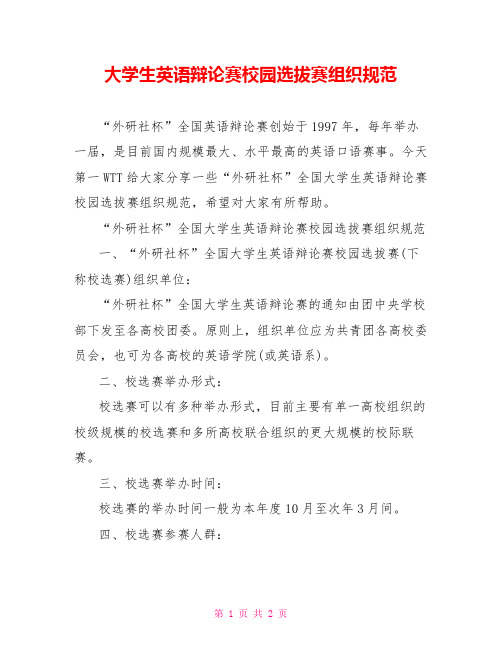
大学生英语辩论赛校园选拔赛组织规范
“外研社杯”全国英语辩论赛创始于1997年,每年举办一届,是目前国内规模最大、水平最高的英语口语赛事。
今天第一WTT给大家分享一些“外研社杯”全国大学生英语辩论赛校园选拔赛组织规范,希望对大家有所帮助。
“外研社杯”全国大学生英语辩论赛校园选拔赛组织规范
一、“外研社杯”全国大学生英语辩论赛校园选拔赛(下称校选赛)组织单位:
“外研社杯”全国大学生英语辩论赛的通知由团中央学校部下发至各高校团委。
原则上,组织单位应为共青团各高校委员会,也可为各高校的英语学院(或英语系)。
二、校选赛举办形式:
校选赛可以有多种举办形式,目前主要有单一高校组织的校级规模的校选赛和多所高校联合组织的更大规模的校际联赛。
三、校选赛举办时间:
校选赛的举办时间一般为本年度10月至次年3月间。
四、校选赛参赛人群:
校选赛参赛人群为具有中国国籍的全日制在校大学本科生和研究生,专业不限。
五、注意事项:
1.校选赛应严格按照BP赛制进行选拔,相关赛制应在赛前作好培训。
2.校选赛应严格辩题审核,避免政治导向和文化安全问题,辩题不应涉及政治敏感内容。
3.单一高校组织的校选赛应组织不少于3轮比赛,应尽量安排前4名决赛对决。
4.多校组织的校际联赛应组织不少于5轮比赛,须安排前4名决赛对决。
校际联赛没有保护原则,当同一赛场出现多支同校队伍时,不作排他处理。
5.所有参赛选手都应在大赛官网或微信平台注册报名,未注册报名的队伍,将不予以晋级资格。
西北民族大学首届英语辩论赛暨第十五届“外研社杯”全国英语辩论赛校内选拔赛辩手职责与评分准则
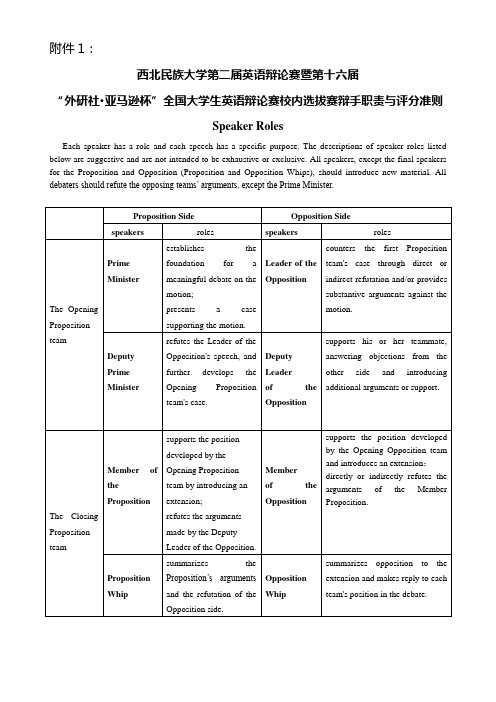
附件1:西北民族大学第二届英语辩论赛暨第十六届“外研社·亚马逊杯”全国大学生英语辩论赛校内选拔赛辩手职责与评分准则Speaker RolesEach speaker has a role and each speech has a specific purpose. The descriptions of speaker roles listed below are suggestive and are not intended to be exhaustive or exclusive. All speakers, except the final speakers for the Proposition and Opposition (Proposition and Opposition Whips), should introduce new material. All debaters should refute the opposing teams’ arguments, except the Prime Minister.辩手职责每位辩手需在辩论中各司其职。
除正反方最后一名辩手(内阁党鞭和反对党党鞭)外,所有的辩手都应引入新内容。
除正方一辩(首相)外,所有辩手都应进行反驳。
评委将根据各队论点的有力程度为各辩手评分,而不能单凭其完成自己职责的程度评分。
Speaker Points GuidelinesTeams should be ranked on the basis of their matter and manner.Matter refers to the content and substance of a team’s arguments. Matter includes arguments and reasoning, evidence, examples, case studies, facts, statistics and any other material that a team uses to further the case. Matter includes both positive (or substantive) material and refutation (arguments specifically aimed to counter the arguments of the opposing team(s)).Matter should be relevant, logical and consistent. It should relate to the issues of the debate: positive material should support the case being presented and refutation should engage the material presented by the opposing team(s). Arguments should be developed logically in order to be clear and well reasoned and therefore plausible. The conclusion of all arguments should support the member’s case. Members should ensure that the matter they present is consistent within their speech, their team and the remainder of the members on their side of the debate. All members should present positive matter (except the final two members in the debate) and all members should engage in refutation (except the first member in the debate). The Government Whip may choose to present positive matter if it is relevant to refuting the Member of the Opposition’s extension.Manner refers to the strategy and presentation of a team’s arguments. Manner includes elements such as argument choice, speech structure, vocal and physical delivery, use of POIs, and so forth.Manner should enhance the team’s effort to prove or disprove th e motion and should be compelling. To enhance their effort, the team should appropriately prioritize and apportion time to the dynamic issues of the debate, present their arguments in an order that is clear and logical, engage the arguments of the opposing side through direct or indirect refutation. Compelling manner is that which presents the material in a way that demonstrates a concern for vocal and physical presentation. Compelling teams deliver arguments with appropriate levels of passion, present their material in a way that attends to appropriate vocal and physical delivery, and avoid behaviors that detract from the force and effectiveness of their arguments.This description of matter and manner is necessarily incomplete. The adjudication panel should assess the totality of each team’s efforts (including, but not limited to, matter and manner) to achieve a just and fair decision.After the adjudicators have agreed upon the ranking for each team, the panel should determine the speaker scores for each debater. Individual speaker scores should be assigned as follows, where a score of 75 would reflect an average effort at the tournament.The aggregate of the two team members’ individual speaker scores will comprise their team’s team score. Ea ch team must receive a team score appropriate to their rank in the debate; no “low point wins” may be assigned. For example, if the 2nd place team in the round is assigned an aggregate team score of 170 points, the 1st place team must receive at least 171 aggregate points. Ties in team scores are not permitted.评分准则评委主要根据选手在素材(Matter)和辩论风格及策略(Manner)两方面的表现打分。
第二十届“外研社杯”英语辩论大赛活动方案
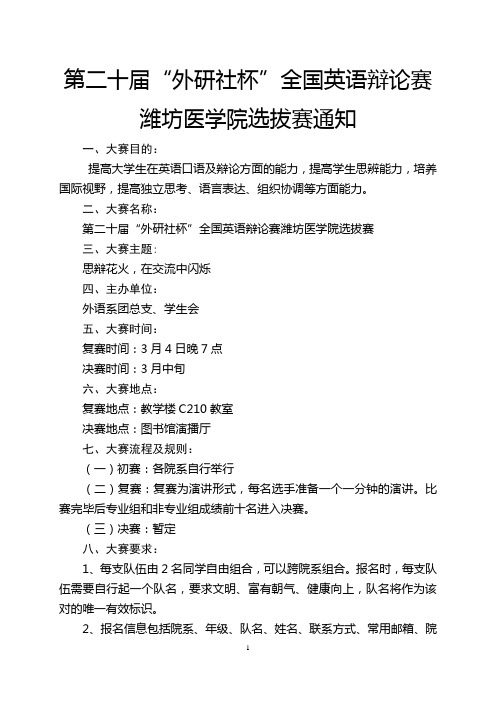
第二十届“外研社杯”全国英语辩论赛潍坊医学院选拔赛通知
一、大赛目的:
提高大学生在英语口语及辩论方面的能力,提高学生思辨能力,培养国际视野,提高独立思考、语言表达、组织协调等方面能力。
二、大赛名称:
第二十届“外研社杯”全国英语辩论赛潍坊医学院选拔赛
三、大赛主题:
思辩花火,在交流中闪烁
四、主办单位:
外语系团总支、学生会
五、大赛时间:
复赛时间:3月4日晚7点
决赛时间:3月中旬
六、大赛地点:
复赛地点:教学楼C210教室
决赛地点:图书馆演播厅
七、大赛流程及规则:
(一)初赛:各院系自行举行
(二)复赛:复赛为演讲形式,每名选手准备一个一分钟的演讲。
比赛完毕后专业组和非专业组成绩前十名进入决赛。
(三)决赛:暂定
八、大赛要求:
1、每支队伍由2名同学自由组合,可以跨院系组合。
报名时,每支队伍需要自行起一个队名,要求文明、富有朝气、健康向上,队名将作为该对的唯一有效标识。
2、报名信息包括院系、年级、队名、姓名、联系方式、常用邮箱、院
系负责人及联系方式。
3、比赛时请各支队伍注意会场秩序。
九、大赛预期效果:
通过此次大赛,可以充分调动广大同学学习英语的积极性,培养学生口语交际能力,提高大学生对英语的辩论能力,有利于改善普遍存在的"哑巴英语"的问题。
同时,此次大赛也为热爱英语的大学生提供了一个展现自我,秀出风采的舞台,有利于全力打造一个具有全面性、专业性,健康积极的品牌大赛,将辩论思维和外语融合,充分挖掘当代大学生的潜能,展现大学生的青春魅力和个性风采。
外语系团总支
2017年3月。
26届外研社国才杯英语辩论赛辩题
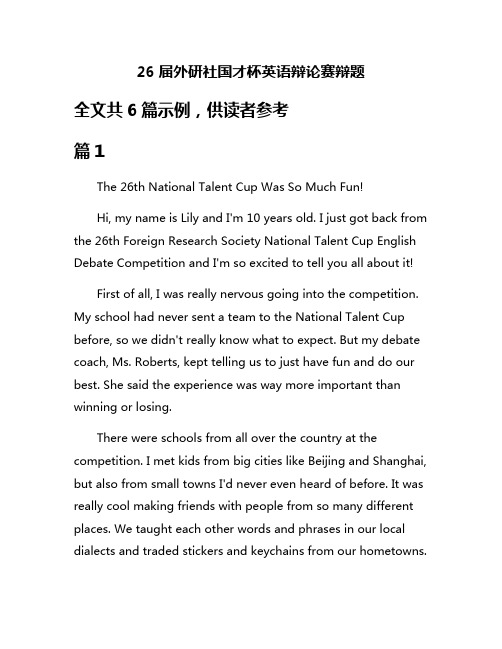
26届外研社国才杯英语辩论赛辩题全文共6篇示例,供读者参考篇1The 26th National Talent Cup Was So Much Fun!Hi, my name is Lily and I'm 10 years old. I just got back from the 26th Foreign Research Society National Talent Cup English Debate Competition and I'm so excited to tell you all about it!First of all, I was really nervous going into the competition. My school had never sent a team to the National Talent Cup before, so we didn't really know what to expect. But my debate coach, Ms. Roberts, kept telling us to just have fun and do our best. She said the experience was way more important than winning or losing.There were schools from all over the country at the competition. I met kids from big cities like Beijing and Shanghai, but also from small towns I'd never even heard of before. It was really cool making friends with people from so many different places. We taught each other words and phrases in our local dialects and traded stickers and keychains from our hometowns.The team we debated against was really good though. They said homework helps reinforce what kids learn in class, teaches discipline and time management skills, and lets parents stay involved in their child's education. I have to admit, they made some pretty good points!In the end, we didn't win our debate round. But Ms. Roberts reminded us that the most important thing was speaking confidently and clearly. She said we all did an amazing job and should be proud of ourselves just for making it to nationals.My favorite part of the whole experience was probably the cultural performances during the breaks though. There were singing, dancing, musical acts, and more from kids representing their hometowns. I saw ribbon dances, face changing shows, bamboo dances, and all sorts of other awesome acts I'd never seen before. The costumes were so bright and beautiful!I also tried so many delicious foods I'd never had before. The kids from Sichuan brought super spicy dried tofu and the Shanghai team shared their famous xiaolongbao with us. A girl from Inner Mongolia packed me a little bag of milk candy that was absolutely delicious. My favorite was probably the candied hawthorn berries from the Shaanxi team though. So yummy!Overall, the 26th Foreign Research Society National Talent Cup was one of the best experiences of my life so far. I got to travel outside my hometown for the first time, made tons of new friends, tried delicious foods, and learned so much about public speaking and debate. Even though we didn't win, I feel like I gained important skills that will help me out for the rest of my life.Ms. Roberts said she's already making plans for us to attend again next year and hopefully make it even further in the competition rounds. I can't wait! If you ever get the chance to participate in the National Talent Cup, you absolutely should. It's an amazing opportunity to have fun, learn new things, and make incredible memories. Thanks for reading about my experience!篇2The Best Pet EverHi, my name is Lilly and I'm 8 years old. Today I want to tell you all about why dogs are the best pets ever. I have a dog named Buddy and he's my very best friend in the whole wide world!First of all, dogs are so much fun to play with. Buddy loves to run and jump and chase after balls and frisbees. We play fetch inthe backyard all the time. He gets so excited when I throw the ball and he zooms after it at top speed. Then he proudly trots back with it in his mouth, tail wagging a million miles an hour. I throw it again and we repeat the game over and over until we're both panting and tired. It's the best exercise ever!Dogs also make really great snuggle buddies. At night, Buddy curls up at the foot of my bed and keeps my feet warm. Sometimes he'll hop up and snuggle right next to me. I bury my face in his soft fur and he always smells so good, like the outdoors. Having Buddy there makes me feel safe and happy. I give him a big hug and he licks my cheek which makes me giggle.Buddy is super smart too. My parents trained him to do all sorts of cool tricks. He can sit, stay, shake, roll over, and play dead. We're working on teaching him to close doors and bring us his leash. I think he's going to be a therapy dog when he grows up so he can cheer up people in hospitals and nursing homes with his silly tricks. He's already an expert snuggler!Another awesome thing about dogs is that they can be your protector. Sometimes I get scared of noises outside or worry there might be a burglar. But Buddy is always on guard, listening carefully. If he hears anything suspicious, his ears perk up and hestarts barking to let us know. He'd never let anything bad happen on his watch. Just knowing Buddy is looking out for me makes me feel brave.Dogs can also be really helpful friends. Like this one time, I got my kite stuck really high up in a tree. I tried throwing sticks to knock it down but I couldn't reach. Then Buddy came over and easily jumped up and grabbed the string in his mouth! With a few good tugs, he pulled it free. I was so proud of my clever pup. If he wasn't there, I probably would have lost my kite forever up in that tree.The biggest reason why dogs are the greatest pets, though, is because they are so loving and loyal. No matter what kind of day I've had at school, Buddy is always sooo happy to see me when I get home. He wiggles his whole body with excitement and showers me with doggy kisses. Dogs really are a kid's best friend.Buddy shows me unconditional love every single day. Even when I'm crabby or ignore him, he never stays mad at me. He just keeps wagging his tail and trying to cheer me up with snuggles and slobbery kisses. Dogs don't judge or hold grudges. They just want to make you happy!I love Buddy more than anything and he loves me back just as much. We're totally inseparable. I tell him all my secrets and problems and he's a great listener. He never interrupts or laughs at me. Dogs are like that - they keep your secrets safe and comfy.A pet like Buddy is better than a diary!That's why I really think dogs make the perfect pet, especially for kids like me. They are playful, cuddly, smart, protective, helpful, and most of all loyal and loving. I'm so lucky my parents let me have an awesome dog like Buddy. I can't imagine a happier life without a furry best friend!In conclusion, all kids should get to have the experience of having a dog as a pet. They make playtime way more fun and exciting. They keep you safe and secure. They teach you responsibility from a young age. And most importantly, dogs篇3My Big English Debate AdventureHi everyone! My name is Lily and I'm 10 years old. I just had the coolest experience ever - I got to be part of the 26th Foreign Research Society National Talent Cup English Debate Competition! It was so much fun and I learned a ton. Let me tell you all about it!It all started a few months ago when my English teacher, Ms. Roberts, told our class about this big debate competition. She said students from all around the country would team up and debate really interesting topics...in English! I was a little nervous at first because my English isn't perfect, but Ms. Roberts said it would be a great way to practice.After school one day, a bunch of us who were interested stayed to learn more about it. We had to pick partners to work with and then choose which side of the debate topic we wanted to argue for or against. The topic for our level was "Schools should have longer break times for students." I partnered up with my friend Jack and we decided to argue FOR having longer break times. Jack and I both love recess so this was perfect for us!For the next few weeks, Jack and I worked super hard after school researching all the reasons why kids need more break time during the day. We read articles about how uninterrupted play helps kids' brains develop better and how running around makes it easier to focus in class. Ms. Roberts helped us put together our debate arguments and evidence. We even practiced delivering our speeches in front of the class.Finally, the big day of the regional debate competition arrived! Jack and I were so nervous but also really excited. Thecompetition was held at the local community college and there were so many students from other schools there. First, we had to deliver our prepared arguments one at a time. I went first and I was shaking a little, but I took some deep breaths and it went pretty well! Jack did an awesome job too.Then came the hardest part - the open cross-examination. This is where the other team asks you questions to try and poke holes in your arguments. And you have to ask them questions too without knowing what they'll say! The other team was really good but I think we defended our side strongly.After about an hour of intense debating back and forth, it was finally over. We weren't sure how we did compared to the other teams. But Jack and I were just proud of ourselves for working so hard and doing our best.A few weeks later, we found out that we actually won the regional competition! We were jumping for joy. This meant we'd get to compete against teams from across the whole country in the national finals in a few months. More preparation time!The national finals were held in the capital city and it was like a huge debate party. There were kids fromall over the country and we got to watch the older students debate some really complex and interesting topics like "Social media does moreharm than good" and "Governments should invest more in sustainable energy than fossil fuels." Just listening to them was extremely impressive andmade me want to work even harder on my English skills.When it was our turn to debate the break time topic, I was feeling a lot more confident after our regional win. We had practicedand prepared a ton. And being around so many bright, talented kids from different cultures was just really inspiring and motivating.The other team we went up against was also super good. But Jack and I stayed focused, communicated with each other really well, and gaveit everything we had. By that point, we didn't even really care if we won or not because the whole experience had beenso rewarding.At the award ceremony later that night, they announced the winner for our level...and it was us! We Had won the national championship! Jack and I jumped up cheering and hugging. All of our hardwork and perseverancepaid off. Earning that big trophy felt incredible.More than that though, being part of this debate competition made me love learning English so much more. Sure, it's hard sometimes and there's a lot of tricky vocabulary andgrammar rules to master. But being able to communicate effectively and articulate your thoughts is such an important skill. And it opens up somany opportunities to connect with new ideas and new people from all over the world.I'm already looking forward to next year's competition! Maybe I'll get to debate about something like "Schools should abolish homework" or "Children should have more say in important family decisions." Whatever it is, I know it will push me to be a better English speaker and learner. Wish me luck!篇4The Big Debate: Should Kids Have Homework?Hi there! My name is Jamie and I'm a 4th grader. I love playing outside, reading comic books, and hanging out with my friends. But there's one thing I really don't like...homework! I think kids shouldn't have to do homework after school. Let me tell you why.First of all, we already spend so much time at school! We wake up super early, like 6am, and don't get home until 3 or 4pm. That's like 8 or 9 hours at school every day! When we get home, we're totally wiped out. The last thing we want is more schoolwork piled on top of our already long day. Kids need timeto recharge after being "on" at school all day. Homework just makes our days way too long and tiring.Secondly, we need time for other important stuff besides academics. Exercise is really important for growing kids, but it's hard to run around and play sports if we're stuck inside doing homework for hours. We should be running and jumping,not sitting at a desk! Kids also need downtime to just relax andde-stress. Too much homework means no free time for hobbies, hanging with friends, or just vegging out. That's no way for a kid to live!Another big problem with homework is that it causes way too much stress and anxiety, especially as we get older. My older sister is in middle school and she's up until midnight most nights wrestling with homework from all her classes. She's always cranky from lack of sleep and under so much pressure. School should challenge us, not make us miserable! Too much homework leads to overstressed, overtired, and overwhelmed kids. No thanks!I get that teachers want us to practice skills and prepare for tests. But piling on tons of homework isn't the only way to do that. We could have study hall periods during the school day instead. Or teachers could give us short assignments to do inclass. That way, we get the practice we need without having to take it all home with us.At home, we should have time to just be kids - playing, discovering, creating, and imagining. Those things are just as important for our development as academics. With no homework, we'd have time for after-school activities, sports, clubs, or just good old-fashioned playing outside. That's what childhood is all about!Maybe you're thinking - but Jamie, don't you sometimes have homework you actually enjoy? Projects you're excited about or books you want to read? Sure, sometimes. But for the most part, homework is a chore that takes away our free time. And nobody likes chores, right?I know homework won't be going away anytime soon. But I really wish there was a lot less of it, especially in elementary school. We're just kids! We should be using our free time to explore the world around us, not stuck behind a desk for hour after hour. Let kids be kids, I say. We'll be way happier, healthier, and maybe we'll even learn better without all that extra homework weighing us down.Well, that's my take on the big homework debate. I could go on and on, but I'd probably just get in trouble for turning thisessay in late. No more homework tonight - I'm outta here to the playground!篇5My Big English Debate AdventureHi there! My name is Lily and I'm in 5th grade. I just had the coolest experience and I can't wait to tell you all about it!A few months ago, my English teacher Ms. Roberts announced that our school was going to send a team to compete in the 26th Foreign Research Society National Talent Cup English Debate Competition. She said it was a really big deal and the best English student debaters from schools all across the country would be there. I had never done any debating before, but I loved English class and public speaking, so I decided to try out for the team.The tryouts were kind of nerve-wracking. We had to debate practice topics, like whether vegetables taste better than candy (they don't!) and if dogs make better pets than cats (obviously dogs!). But I guess I did a pretty good job because I made the team! There were four of us total - me, my best friend Jake, Eric from the other 5th grade class, and Sarah who's a year older than us.Then the real work began. We had debate practice every day after school for hours. Ms. Roberts taught us all about different debate formats, how to construct arguments, do research, deliver rebuttals, and stay poised under pressure. It was a lot of work but I was having a blast. My parents were so proud of me too.Finally, the big day arrived and it was time to head to the competition in Washington D.C.! The ride there felt like it took forever. When we got to the hotel, my mind was blown by how fancy it was. There were students from all over the place and I was just in awe of how cultured and wordly everyone seemed.The next morning, the debates started bright and early. I was ONE NERVOUS WRECK! My stomach felt like it was full of butterfly robots. But as soon as I stepped up to the podium, all my nerves melted away. I was in the zone. We debated all sorts of topics - the greatest inventions, the importance of arts education, climate change, you name it. Some of the other teams were really good and It was a huge challenge, but I loved every second.By the last day of the competition, I was exhausted but on a total adrenaline high at the same time. When they announced the winners, I couldn't believe my ears - our team came in 3rdplace!! I had worked so hard and it paid off. As we walked up on stage to receive our medals, I felt like a million bucks. My parents were cheering so loud. Afterwards, they took me, Jake, Eric, and Sarah out for a celebratory dinner. I'm pretty sure I ate my weight in pasta and ice cream that night!Now that I'm back at school, things are back to normal in a lot of ways. But I'm definitely looking at the world a little differently. I feel more confident, like I can take on any challenge. And my writing and public speaking skills are better than ever. Some of the other kids have been asking me about debate team tryouts for next year. You can bet I'll be there!This experience was so amazing and life-changing for me. If you ever get a chance to do something like the National Talent Cup or any English debate/speech competition, go for it! It's hard work but so rewarding. You might even surprise yourself with what you're capable of, just like I did. Thanks for reading about my big adventure - I'm already counting down the days until next year!篇6The 26th New Oriental National Talent Cup English Debate CompetitionWow, you guys! Did you hear about the 26th New Oriental National Talent Cup English Debate Competition? It's like the biggest and most awesome English debate contest for us kids in the whole country! I'm so excited because my English teacher said our class might get to participate this year. How cool would that be?For those of you who don't know, the National Talent Cup is a huge debate competition organized by New Oriental, one of the biggest education companies in China. But it's not just any boring old debate. It's all in English! Can you imagine? Hundreds of elementary and middle school students from all across China going head-to-head, debating different topics entirely in English. Just thinking about it makes my heart race!The best part is, the topics they debate are always really interesting and relevant to kids our age. Last year, one of the debate motions was "Parents should limit children's time spent playing video games." Another was "Schools should not have final exams." See what I mean? Things we actually care about and have strong opinions on!My English teacher, Ms. Wang, has been prepping our class non-stop over the past few weeks. She's been having us do mock debates during class and pointing out our strengths andweaknesses in English speaking, critical thinking, and rebuttals. It's a lot of work, but I've learned so much already. Like did you know the words "refute" and "refutation" are super useful in debates? They mean to prove something is wrong or false. Handy, right?The best students from each school get to form a team of three and compete at the city level first. If they make it past that round, they go on to represent their city at the provincial finals. And if they're really amazing, they might even get to go all the way to the national finals in Beijing! Just picturing myself on that big stage, spotlights shining down, defending my arguments...shivers. That would be a dream come true.Mama and Baba have been so supportive and encouraging. They promise to be my personal cheering squad no matter how far I advance. Though Baba did joke that if I make it to the national finals, he'll shave his head bald if I bring home the championship trophy. You better believe I'm going to hold him to that!Anyways, I still have a lot of practicing and preparing to do before the competition really gets going. But I'm going to give itmy all and make sure I leave no unturned. This could be my big chance to shine and show everyone what I've got. Debates, here I come!If any of you are competing too, I wish you the best of luck. Though not too much luck, because I want to win! Just kidding...or am I? You'll have to wait and see. Let the debates begin!。
第13届外研社杯全国英语辩论赛中山大学选拔赛成绩揭晓(精)
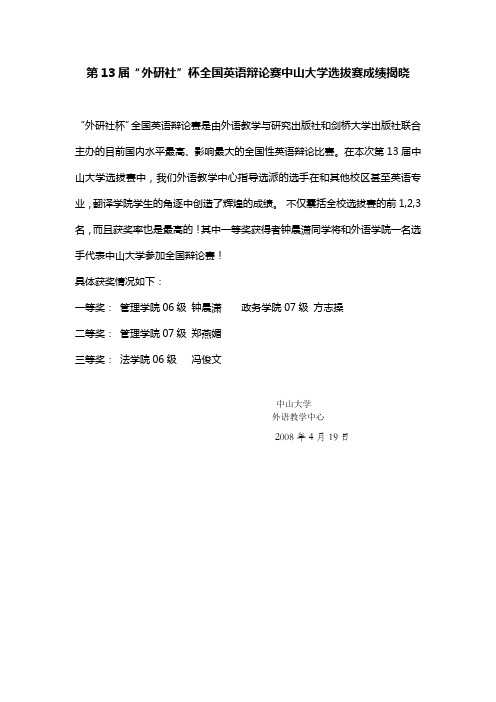
第13届“外研社”杯全国英语辩论赛中山大学选拔赛成绩揭晓
“外研社杯”全国英语辩论赛是由外语教学与研究出版社和剑桥大学出版社联合主办的目前国内水平最高、影响最大的全国性英语辩论比赛。
在本次第13届中山大学选拔赛中,我们外语教学中心指导选派的选手在和其他校区甚至英语专业,翻译学院学生的角逐中创造了辉煌的成绩。
不仅囊括全校选拔赛的前1,2,3 名,而且获奖率也是最高的!其中一等奖获得者钟晨潇同学将和外语学院一名选手代表中山大学参加全国辩论赛!
具体获奖情况如下:
一等奖:管理学院06级钟晨潇政务学院07级方志操
二等奖:管理学院07级郑燕媚
三等奖:法学院06级冯俊文
中山大学
外语教学中心
2008年4月19日。
【最新】外研社杯英语辩论赛的具体流程与注意事项-范文模板 (3页)
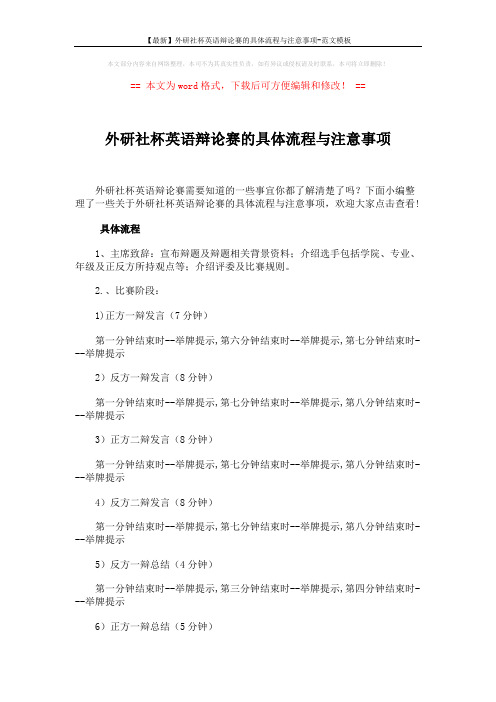
本文部分内容来自网络整理,本司不为其真实性负责,如有异议或侵权请及时联系,本司将立即删除!== 本文为word格式,下载后可方便编辑和修改! == 外研社杯英语辩论赛的具体流程与注意事项外研社杯英语辩论赛需要知道的一些事宜你都了解清楚了吗?下面小编整理了一些关于外研社杯英语辩论赛的具体流程与注意事项,欢迎大家点击查看!具体流程1、主席致辞:宣布辩题及辩题相关背景资料;介绍选手包括学院、专业、年级及正反方所持观点等;介绍评委及比赛规则。
2.、比赛阶段:1)正方一辩发言(7分钟)第一分钟结束时--举牌提示,第六分钟结束时--举牌提示,第七分钟结束时---举牌提示2)反方一辩发言(8分钟)第一分钟结束时--举牌提示,第七分钟结束时--举牌提示,第八分钟结束时---举牌提示3)正方二辩发言(8分钟)第一分钟结束时--举牌提示,第七分钟结束时--举牌提示,第八分钟结束时---举牌提示4)反方二辩发言(8分钟)第一分钟结束时--举牌提示,第七分钟结束时--举牌提示,第八分钟结束时---举牌提示5)反方一辩总结(4分钟)第一分钟结束时--举牌提示,第三分钟结束时--举牌提示,第四分钟结束时---举牌提示6)正方一辩总结(5分钟)第一分钟结束时--举牌提示,第四分钟结束时--举牌提示,第五分钟结束时---举牌提示注意事项:在提示牌提示结束后,有20秒宽限期,发言者必须在此期间内完成自己的发言,如果超过宽限期,则扣分.如果发言者发言时间远远少于规定时间,则评委会将此看作没有充分展开自己的观点而给发言者扣分.在前1-4环节中,对方可以根据发言者正在申诉的论点提出本方的观点(pointofinformation,简称为POI)提问者提出POI的注意事项:1)POI要简短,切题,机智。
严禁针对比赛规则和个人提出问题;2)提出POI时要从座位上起立,并举手示意.提问者可以用类似onthatpoint,Sir/Madam的话引起发言者的注意;3)发言者可以采取以下方式回应对方提出的POI:语言拒绝(类似sorry)、接受提问(类似ok);4)如果提出POI的要求被发言者接受,那么POI的陈述要以澄清事实或提出评论为形式,用一两句话在15秒内表达出来;如果被发言者拒绝,那么提问者坐回原位,准备下一次提问;5)POI只能在前四个环节中提出,最后两个环节不能提出,前四个环节内第一分钟和最后一分钟内不可以提出POI;6)发言者如果接受POI,那么就应针对提问并围绕自己的发言回答问题;7)除非要提出POI,否则没有轮到发言的辩手不得在别人发言时起立。
外研杯辩论赛校选赛规则
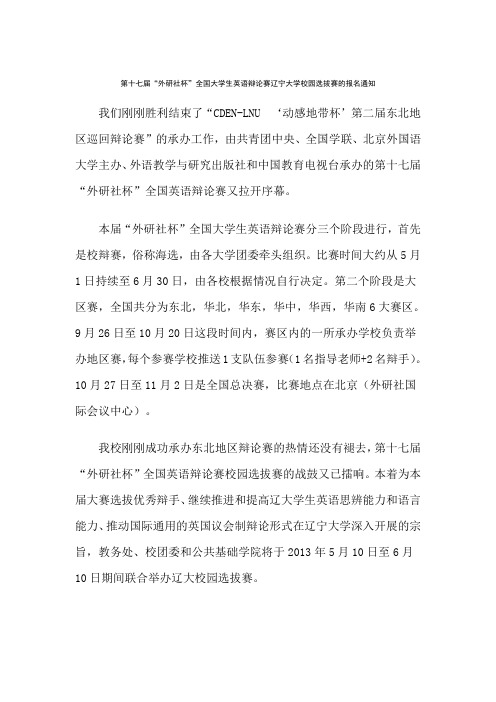
第十七届“外研社杯”全国大学生英语辩论赛辽宁大学校园选拔赛的报名通知我们刚刚胜利结束了“CDEN-LNU ‘动感地带杯’第二届东北地区巡回辩论赛”的承办工作,由共青团中央、全国学联、北京外国语大学主办、外语教学与研究出版社和中国教育电视台承办的第十七届“外研社杯”全国英语辩论赛又拉开序幕。
本届“外研社杯”全国大学生英语辩论赛分三个阶段进行,首先是校辩赛,俗称海选,由各大学团委牵头组织。
比赛时间大约从5月1日持续至6月30日,由各校根据情况自行决定。
第二个阶段是大区赛,全国共分为东北,华北,华东,华中,华西,华南6大赛区。
9月26日至10月20日这段时间内,赛区内的一所承办学校负责举办地区赛,每个参赛学校推送1支队伍参赛(1名指导老师+2名辩手)。
10月27日至11月2日是全国总决赛,比赛地点在北京(外研社国际会议中心)。
我校刚刚成功承办东北地区辩论赛的热情还没有褪去,第十七届“外研社杯”全国英语辩论赛校园选拔赛的战鼓又已擂响。
本着为本届大赛选拔优秀辩手、继续推进和提高辽大学生英语思辨能力和语言能力、推动国际通用的英国议会制辩论形式在辽宁大学深入开展的宗旨,教务处、校团委和公共基础学院将于2013年5月10日至6月10日期间联合举办辽大校园选拔赛。
由公共基础学院具体负责的辽宁大学校园选拔活动从即日起正式开始报名,报名截止时间为4月27日(周六)下班前。
选拔赛分为初赛、循环赛和淘汰赛三个环节。
第一场初赛时间5月8日(周三)下午2点,地点为崇山校区蕙星楼9楼。
报名具体事宜如下:一、赛事说明:1.本届校园选拔赛应由初选赛、循环赛和淘汰赛三部分组成;在初选和循环赛阶段,每场比赛由1或3名老师担任评委;淘汰赛阶段由3名以上老师担任评委;2.“外研社杯”全国辩论赛采用英国议会制辩论形式(4队制,正反方分上、下院,只有英文辩论形式。
鉴于大部分学生在接受正式培训前对此辩论形式不够熟悉,所以本届校园选拔赛的初赛仍将采用普通辩论形式测试,即只有正反两方,目的在于考察辩手的现场反应以及知识面、表达能力。
第十六届外研社亚马逊杯全国大学生英语辩论大赛校园选拔赛介绍
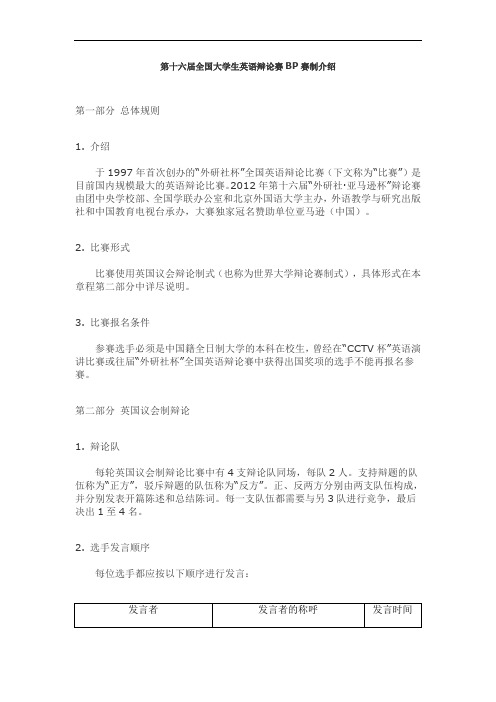
第十六届全国大学生英语辩论赛BP赛制介绍第一部分总体规则1. 介绍于1997年首次创办的“外研社杯”全国英语辩论比赛(下文称为“比赛”)是目前国内规模最大的英语辩论比赛。
2012年第十六届“外研社·亚马逊杯”辩论赛由团中央学校部、全国学联办公室和北京外国语大学主办,外语教学与研究出版社和中国教育电视台承办,大赛独家冠名赞助单位亚马逊(中国)。
2. 比赛形式比赛使用英国议会辩论制式(也称为世界大学辩论赛制式),具体形式在本章程第二部分中详尽说明。
3. 比赛报名条件参赛选手必须是中国籍全日制大学的本科在校生,曾经在“CCTV杯”英语演讲比赛或往届“外研社杯”全国英语辩论赛中获得出国奖项的选手不能再报名参赛。
第二部分英国议会制辩论1. 辩论队每轮英国议会制辩论比赛中有4支辩论队同场,每队2人。
支持辩题的队伍称为“正方”,驳斥辩题的队伍称为“反方”。
正、反两方分别由两支队伍构成,并分别发表开篇陈述和总结陈词。
每一支队伍都需要与另3队进行竞争,最后决出1至4名。
2. 选手发言顺序每位选手都应按以下顺序进行发言:3. 发言计时每位辩手的发言的时间均为7分钟。
辩手提出“质询”的时间应在第2到第6分钟之间。
“质询”是指在对方发言时,针对发言者正在申述的论点提出的本方观点。
发言计时从辩手开始说话为始;所有必要内容(包括说明、介绍等)都在计时范围内。
计时人员将在以下时间点向选手示意:时间标示:第一分钟末响铃一次(允许开始提出“质询”)第六分钟末响铃一次(提出“质询”的时间结束)第七分钟末7:00 连续响铃两次(发言时间结束)超时15秒之后7:15 连续响铃(发言缓冲时间结束)在连续两次响铃结束后辩手有15秒“缓冲”时间,在这段时间内允许选手总结已出具论点。
“缓冲”时间内不允许出具新论据,在“缓冲”时间内提出的新论据可以被裁判判为无效。
在“缓冲”时间后仍继续发言的辩手将被裁判团扣分。
4. 辩手角色分配每个选手都有一个定位,每一个发言都有其特殊目的。
第十五届外研社杯英语辩论赛辩题
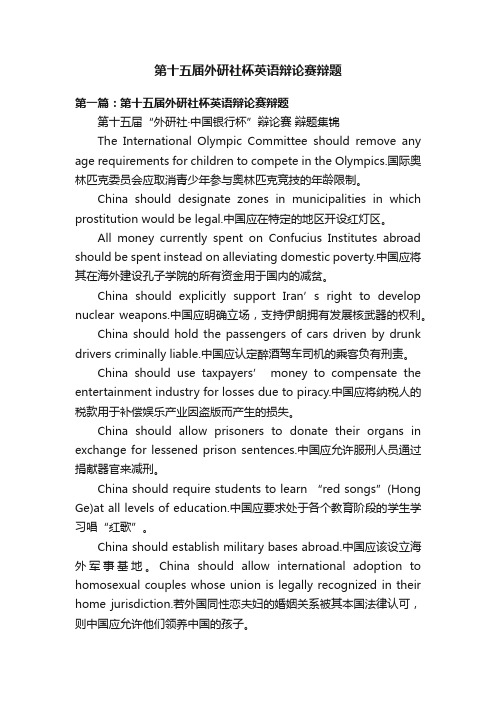
第十五届外研社杯英语辩论赛辩题第一篇:第十五届外研社杯英语辩论赛辩题第十五届“外研社·中国银行杯”辩论赛辩题集锦The International Olympic Committee should remove any age requirements for children to compete in the Olympics.国际奥林匹克委员会应取消青少年参与奥林匹克竞技的年龄限制。
China should designate zones in municipalities in which prostitution would be legal.中国应在特定的地区开设红灯区。
All money currently spent on Confucius Institutes abroad should be spent instead on alleviating domestic poverty.中国应将其在海外建设孔子学院的所有资金用于国内的减贫。
China should explicitly support Iran’s right to develop nuclear weapons.中国应明确立场,支持伊朗拥有发展核武器的权利。
China should hold the passengers of cars driven by drunk drivers criminally liable.中国应认定醉酒驾车司机的乘客负有刑责。
China should use taxpayers’ money to compe nsate the entertainment industry for losses due to piracy.中国应将纳税人的税款用于补偿娱乐产业因盗版而产生的损失。
China should allow prisoners to donate their organs in exchange for lessened prison sentences.中国应允许服刑人员通过捐献器官来减刑。
1 第十七届“外研社当当网”全国大学生英语辩论赛华南师范大学选拔赛 2

Awarding
The End! Thank you!
“反方领袖”
Байду номын сангаас
5分钟
5分钟
“副首相”或“正方第二领袖 5分钟 ” “反方第二领袖” 5分钟 5分钟 5分钟 5分钟 5分钟
正方总结陈词第三辩手(即“正方成员” 正方二队一辩) 反方总结陈词第三辩手(即“反方成员” 反方二队一辩) 正方总结陈词第四辩手(即“正方党鞭” 正方二队二辩) 反方总结陈词第四辩手(即“反方党鞭” 反方二队二辩)
时间标示: 第1分钟末 举牌一次(允许开始提出“质询”) 第4分钟末 举牌一次(提出“质询”的时间结束) 第4分钟末5分钟 举牌,主持人要提醒发言时间结束(发言 时间结束) 如时间到后选手仍未停止发言,且不听从主持人引导,则需扣 除相应分数并视为犯规。
第一轮(the 1st Round)
• 辩题(motion):
This house believes that junk food should be banned in schools.
第二轮(the 2nd Round)
• 辩题(motion):
This house believes vocational training is more important than liberal arts education.
第十七届“外研社•当当网” 全国大学生英语辩论赛 华南师范大学选拔赛
• 主办单位:共青团华南师范大学委员会 • 承办单位:共青团华南师范大学外国语言文化学院委员会
一、选手发言顺序
发言者 发言者的称呼 发言时间
正方开篇陈述第一辩手
反方开篇陈述第一辩手 正方开篇陈述第二辩手 反方开篇陈述第二辩手
“外研社杯”英语辩论赛培训

时间标示
示意
1’00’’ 响铃一次(允许开始提出“质询”) 3’00’’ 响铃一次(提出“质询”的时间结束) 4’00’’ 连续响铃两次(发言时间结束)
4’15’’ 连续响铃(发言“缓冲”时间结束)
(5)评分细则
*
*英国议会制辩论中,正方辩手应论证辩题为真,
反方辩手应阐明辩题为假或说明正方辩手提出 的辩护无法论证辩题为真的原因。双方都应通 过直接或间接的方式反驳对方辩手提出的观 点。
正方上院
正方下院
反方上院
反方下院
*(2)选手发言顺序(所有辩手须按照如
下顺序进行发言)
发言者 正方上院第一位辩手 反方上院第一位辩手 发言者角色 “首相”或“正方领袖” “反方领袖”
正方上院第二位辩手
反方上院第二位辩手 正方下院第一位辩手 反方下院第一位辩手 正方下院第二位辩手 反方下院第二位辩手
/world/
*谢谢大家!
(提供中国英辩赛事 信息)
* 英美新闻网站 : * Economist * Time * New Yorker * Foreign policy * the Atlantic
英国议会制辩论(BP)
*(1)辩论队 *每轮英国议会制辩论比赛中有4支辩论队同场,
每队2人。支持辩题的队伍称为“正方”,驳斥 辩题的队伍称为“反方”。代表正方的两支队伍 是正方上院和正方下院,代表反方的两支队伍是 反方上院和反方下院。本次辩论赛主要采用淘汰 赛制。 *上院只能担任一辩和二辩,下院只能担任三辩和 四辩。
*辩题的措辞平白中立,辩手应尊重辩题原意,
并将辩论核心构建于辩题原意之上。正方上院 诠释辩题时,不应试图歪曲辩题本意。正方上 院首相应在演讲开始为辩题中可能混淆辩论的 词语给出定义。
辩论赛

中国石油大学(华东)选拔赛
为活跃我校校园文化、提高我校学生的英语 能力、展现我校学生的风采,兹决定举办第 十六届“外研社•亚马逊杯”全国英语辩论 赛中国石油大学(华东)选拔赛。
辩论赛
5
大流程
一.个人选拔赛
个人选拔赛—— 10个院 的 82名 同学报名。
这一次的赛事是全国性的大学生辩论大赛—— 通过校领导,和相关部门以及文学院的努力使同学 们有机会参加到这样的比赛中,是很难得机会,这 也起到了抛砖引玉的作用,相信通过这次辩论赛会 有更多的同学参加到其他更多全国性的比赛中。
THE END
半决赛共分3场,每场比赛由4支队伍 参加;12支队伍抽签决定比赛场次; 每场比赛中正方两队、反方两队,抽 签决定立场及发言次序; 赛前15分钟公布辩题; 各队独立准备; 每位辩手发言时间为5分钟,必须至少 有一次质询-答辩环节(POI—point of information)。 辩论不判定输赢,评委根据选手的综 合表现为各支队伍打分,裁定名次。 幵为各位选手打分。 从半决赛12支队伍中取排名靠前的4支 队伍参加决赛。
四.决赛
激情如火 锐利如风 稳定如山
决赛过程
时间:012年4月21日 地点:大学生活动中心
半决赛胜出的4支队伍参加,正方两队、反方两队, 抽签决定立场及发言次序; 赛前15分钟公布辩题; 各队独立准备; 每位辩手发言时间为5分钟,必须至少有一次质询答辩环节(POI—point of information)。 辩论不判定输赢,评委根据选手的综合表现为各支 队伍评分,裁定名次,决出冠军队一支、亚军队一 支、季军队两支。 评委根据选手的综合表现为每位选手评分。进入半
决赛的24位辩手个人平均分居于前六名的将成为
【外研社英语辩论赛辩题】外研社杯英语辩论赛辩题分析
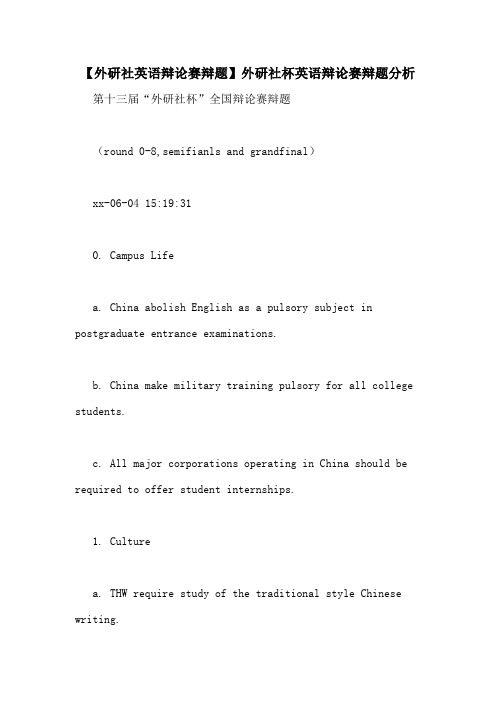
【外研社英语辩论赛辩题】外研社杯英语辩论赛辩题分析第十三届“外研社杯”全国辩论赛辩题(round 0-8,semifianls and grandfinal)xx-06-04 15:19:310. Campus Lifea. China abolish English as a pulsory subject in postgraduate entrance examinations.b. China make military training pulsory for all college students.c. All major corporations operating in China should be required to offer student internships.1. Culturea. THW require study of the traditional style Chinese writing.b. TH opposes the private ownership of artifacts deemed to be national treasures.c. THBT Shanzhai culture is bad for China.2. Educationa. THW base teachers‘s pay on their students‘s performance.b. THW make munity service pulsory for all college students.c. THBT Chinese pulsory education should be extended to 12 years3. Economya. TH supports a new international trading currency.b. THB that China should stop buying US debt.c. China should issue consumption vouchers to stimulate the economy.4. Global climate changea. Developed nations should aept global warming refugeesb. Those affected by global climate change should have the right to sue major carbon-emitting nations.c. China should cap its carbon emissions.5. East Asiaa. Immediate elections are in Thailand抯 best interest.b. ASEAN should expel Myanmarc. Direct negotiations between the US and North Korea are preferable to the Six-Party Talks.6. Family & Populationa. THBT women should be allowed to sell their eggsb. TH would require the father抯 consent for abortions.c. China should legalize marriage between homosexuals.7. Crime & Punishmenta. Criminals sentenced to life imprisonment without parole should be allowed to choose death instead.b. China should establish a national DNA database of all citizens for the purposes of criminal investigations.c. This house would make parents liable for their children 抯 crimes.8. Governing & __a. THW make one-year military service a qualification for public servants.b. TH would require government officials to make full financial disclosure to the public.c. THW make all NPC representatives full-time, professional legislators.Octofinals: Medical servicea. China should ban hymen reconstruction surgeries.b. China should legalize physician-assisted suicide.c. The World Health Organization (WHO) should have the authority to quarantine in times of health crises.Quarterfinals: Judiciarya. China should apply capital punishment only to homicide cases.b. China should fully establish a jury-by-peers system.c. Judges should be elected.Semifinals: International IssuesSEMIFINAL #1a. The Shanghai Cooperation Organization should admit Iran as a full member.b. The United Nations should take control of Jerusalem.c. NATO should fully withdraw from Afghanistan before xx.SEMIFINAL #2a. The USA should stop promoting democracy as part of their foreign policy.b. Pre-emptive strikes on Somalia to curb piracy are justified.c. This house supports Spain抯 criminal prosecution of members of the Bush administration.FinalsThe PRC should ban the production, sale and consumption of all tobao products.内容仅供参考。
外研社杯英语辩论赛规则(3篇)
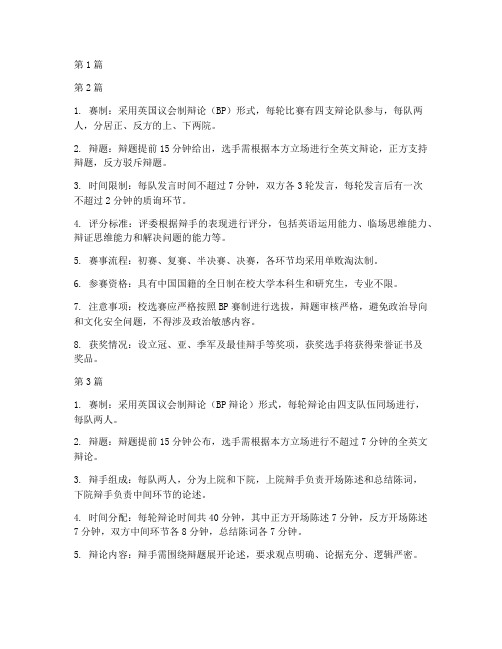
第1篇第2篇1. 赛制:采用英国议会制辩论(BP)形式,每轮比赛有四支辩论队参与,每队两人,分居正、反方的上、下两院。
2. 辩题:辩题提前15分钟给出,选手需根据本方立场进行全英文辩论,正方支持辩题,反方驳斥辩题。
3. 时间限制:每队发言时间不超过7分钟,双方各3轮发言,每轮发言后有一次不超过2分钟的质询环节。
4. 评分标准:评委根据辩手的表现进行评分,包括英语运用能力、临场思维能力、辩证思维能力和解决问题的能力等。
5. 赛事流程:初赛、复赛、半决赛、决赛,各环节均采用单败淘汰制。
6. 参赛资格:具有中国国籍的全日制在校大学本科生和研究生,专业不限。
7. 注意事项:校选赛应严格按照BP赛制进行选拔,辩题审核严格,避免政治导向和文化安全问题,不得涉及政治敏感内容。
8. 获奖情况:设立冠、亚、季军及最佳辩手等奖项,获奖选手将获得荣誉证书及奖品。
第3篇1. 赛制:采用英国议会制辩论(BP辩论)形式,每轮辩论由四支队伍同场进行,每队两人。
2. 辩题:辩题提前15分钟公布,选手需根据本方立场进行不超过7分钟的全英文辩论。
3. 辩手组成:每队两人,分为上院和下院,上院辩手负责开场陈述和总结陈词,下院辩手负责中间环节的论述。
4. 时间分配:每轮辩论时间共40分钟,其中正方开场陈述7分钟,反方开场陈述7分钟,双方中间环节各8分钟,总结陈词各7分钟。
5. 辩论内容:辩手需围绕辩题展开论述,要求观点明确、论据充分、逻辑严密。
6. 语言要求:选手需使用全英文进行辩论,语音、语调、语法、词汇等方面需符合英语表达规范。
7. 评分标准:评委根据辩手的辩论技巧、论据质量、应变能力、团队协作等方面进行评分。
8. 禁忌行为:禁止侮辱、诽谤、人身攻击等不文明行为。
9. 赛事纪律:选手需遵守赛事规定,服从裁判判决,维护赛事秩序。
10. 赛事结果:根据评委评分,评选出获胜队伍和优秀辩手。
通过以上规则,外研社杯英语辩论赛旨在培养辩手的思辨能力、英语表达能力和团队合作精神,提高大学生的综合素质。
- 1、下载文档前请自行甄别文档内容的完整性,平台不提供额外的编辑、内容补充、找答案等附加服务。
- 2、"仅部分预览"的文档,不可在线预览部分如存在完整性等问题,可反馈申请退款(可完整预览的文档不适用该条件!)。
- 3、如文档侵犯您的权益,请联系客服反馈,我们会尽快为您处理(人工客服工作时间:9:00-18:30)。
“外研社杯”英语辩论赛·
西安交通大学校园选拔赛策划书
“外研社杯”全国英语辩论赛是由外语教学与研究出版社(FLTRP)和剑桥大学出版社(CUP)联合主办,中国英语教学研究会(CELEA)、英语口语联盟(ESU)、《英语学习》杂志、国际教育辩论协会(IDEA)协办的国内水平最高、影响最大的全国性英语辩论比赛。
该项赛事自1997年以来每年举办一届,第十一届“外研社杯”全国英语辩论赛受到卡西欧(上海)贸易有限公司的大力支持,定于2007年5月9日至5月16日在北京外研社国际会议中心举行。
应主办方要求,西安交通大学将举行校园选拔赛。
希望通过本次活动, 可以促进和提高我校学生对英语辩论的兴趣以及语言应用水平。
一、参赛资格:辩手必须是在中国大专院校全日制就读的中国籍在校本科学生(曾获得往届
“CCTV杯”全国英语演讲比赛和“外研社杯”全国英语辩论赛出国奖项的选手不可参赛)
二、报名时间:2007年即日起到4月9日
三、报名方式:网上报名(后附报名表,以2人一组报名)报名表发至:xjtupsa@
四、比赛时间: 2007年4月14日-15日
五、比赛地点:教一北二楼语言实验室
六、比赛形式: 比赛将采用议会制。
循环赛采用积分制(赢一场:+1;平:0;输:-1);半决赛及决赛采用淘汰制。
七、奖项设置:
校园选拔赛:将选出一支冠军队,直接到北京参加全国比赛;一支亚军队、及二支季军队。
最佳辩手5人
全国比赛:
冠军队:参加世界大学英语辩论赛
亚军队:参加澳亚大学英语辩论赛
季军队:参加亚洲大学英语辩论赛
最佳辩手(6人):参加国际教育辩论协会辩论培训
八、奖品:由外研社提供的奖品
西安交通大学外国语学院
英语系
2007-3
报名表。
